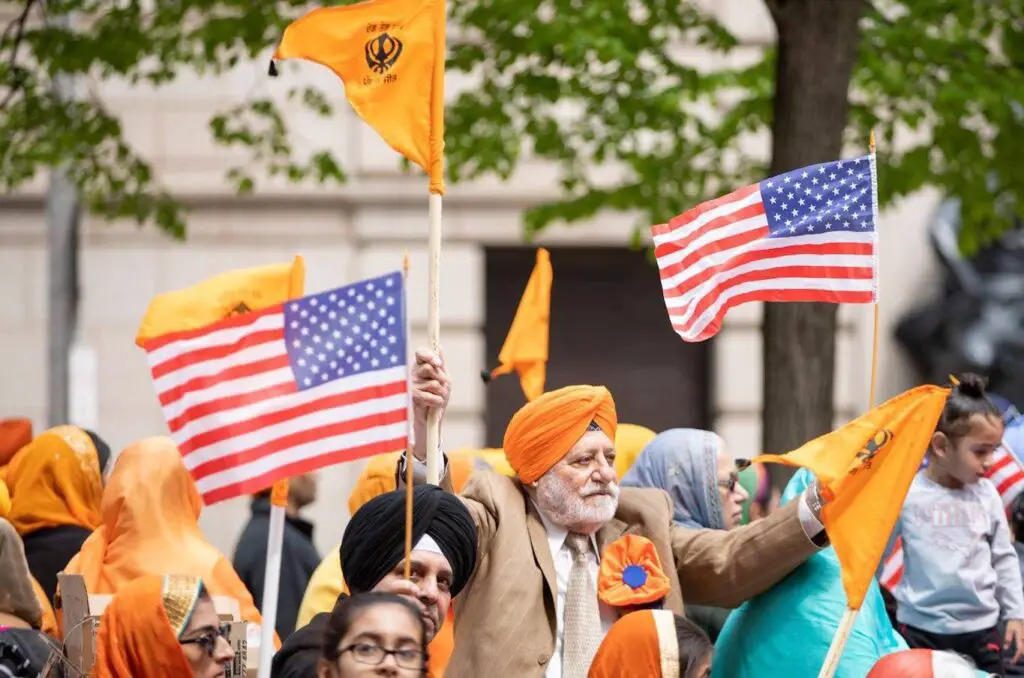April 1st 2022
The advent of Baisakhi (celebrated in mid-April and one of my favorite holidays) commemorates, among other things, the life and achievements of Gobind Singh, the Tenth Guru in the Sikh Tradition. Michel Foucault, while Professor of the History of Systems of Thought at the Sorbonne, once noted that the purpose of studying history is not simply to understand the past, but instead to understand the present as a consequence of the past. The influence of Guru Gobind Singh (1666-1708) can serve as an object lesson for this idea in the history of Sikhism, India, and, indirectly, the rest of the world. Indeed, perhaps the best way to understand his life’s significance is to look at the current state of these venerable traditions today.
The very nature of Sikhism’s most important symbols –embodied in the Khalsa and the five ‘K’s’ Kesh (unshorn hair), kara (steel bracelet), kanga (wooden comb), katcha (shorts), and kirpan (sword), rights to which even remain enshrined in the Indian Constitution’s Fundamental Rights section, originated with Gobind Singh’s inauguration of the Khalsa Panth on Baisakhi. The Adi Granth Sahib, the ‘last Guru’ and sacred text, attained its status and completion at the end of his reign. Also, the tide of Sikh ethnic, religious, and even national identity that culminated in the Sikh empire of Ranjit Singh and has continued in the Sikh-Punjab identity struggle through the 20th century, is tracible to Gobind Singh’s enduring legacy. Sikhism as currently understood and practiced, is only comprehensible as the heritage of Guru Gobind Singh’s historical accomplishments.
The Dasam Granth, attributed to Gobind Singh, extols the nature of reality as united in the divine mind of God—Akal Purak, and many other names—harmonizing all individuals and individuated entities in this cosmic unity. The world remains one in God. This view, an ancient philosophical inheritance of its Dharmic religious origins, has underwritten several fundamental values sustaining Sikhism’s cultural bequest to Indian civilization. Ideas like equality before God and the law, freedom of religion and belief, the fraternity of all humanity, and the universality of justice–all of which remain essential to the social and political fabric of modern nations—can be found in Sikhism’s original tenets. Throughout its history, the Sikh community has consistently promoted religious equality and rejected religious discrimination. Gobind Singh’s own example in which –despite a career fighting oppression against the Sikhs by other religious groups and the martyrdom of his own father by religiously motivated oppressors– he never turned his struggle into a religious war, treated his non-Sikh allies equally, and ensured humane treatment of prisoners and wounded enemies, exemplifies these ideals. He made it clear that the Sikh struggle was (and remains) not simply for the benefit, or even survival, of Sikhism, but instead for the promotion of ultimate Truth and the universal interests of humanity.
Indeed, given these founding principles, it would seem no surprise that India’s Constitution (drafted on November 26th,1949), influenced by a rich amalgam of legal, political and religious ideals–including the entire Dharmic religious heritage from which the Sikh tradition sprang–would also echo Gobind Singh’s Sikh worldview. Gobind Singh’s words:
“Some call themselves Hindu.
Some call themselves Muslim.
And yet man is of one race in all of the world.
Worships one God.
All men have the same form.
All men have the same soul.”
Resonate clearly in the Constitutional Preamble:
“We the people of India, having solemnly resolved to constitute India into a sovereign democratic republic, and to secure all its citizens justice, liberty, equality and fraternity. Assuring the dignity of the individual and the unity of the nation.”
And interestingly, these are also not far from the American Constitution’s Preamble, which states that “We the people, in order to form a more perfect union, establish justice and promote domestic tranquility, provide for the common defense, promote the general welfare and secure the blessings of liberty to ourselves and our posterity”, or even more similar perhaps to the Declaration of Independence which proclaims that “We hold these truths to be self-evident: That all men are created equal. That they are endowed by their creator with certain inalienable rights, among which are life, liberty, and the pursuit of happiness.”
Thus, the foundational principles of the world’s two largest democracies, comprising one sixth of the world’s population, can be better understood in light of their historical and philosophical relationship (in India’s case, more directly) with the basic Dharmic principles that characterized the ideological legacy of Guru Gobind Singh and the Sikh tradition. Both nations share similar social-political values and traditions. Both are extremely ethnically, religiously, and racially, diverse. Though a much younger culture than India, the United States has, like India, been “a nation of immigrants” since its inception, and is an inter-cultural melting-pot by its very nature. India has been a crossroad of multifarious cultural identities for millennia, developing as a forum for the comingling of ideas, institutions, and ways of life, both indigenous and imported, from around the world. In this capacity, both nations have also served as a haven for dispossessed and persecuted groups seeking refuge from oppression. Immigrants to America fleeing political and religious freedom are, ideologically, distant relatives of the ethnic and caste minorities from India’s history. In both countries, freedom has been secured through revolution and independence from colonial powers—In the United States via armed rebellion in the 18th century, and in India, through non-violent struggle and collective political action in the early 20th century. As a result, principles of equality, liberty, fraternity, justice, were implemented deliberately by both nations in their foundational legal rights—via the United States’ Declaration of Independence and Constitution’s Bill of Rights, and the Indian Constitution’s Fundamental Rights, Directive Principles and Fundamental Duties.
The two nations have adopted somewhat divergent manifestations of these principles. The United States has largely embraced a conception of equality-liberty-justice that rests on what is often described as ‘negative freedom’, or freedom from State interference in, or restrictions on, individual liberty. Such freedom is located in personal autonomy—the freedom of individuals to determine their own destiny without external restraint. Freedom of expression, religion, and privacy rights guaranteed by the US Constitution, for instance, are manifestations of negative freedom attached to autonomous individuals. India in contrast, has often emphasized what is often referred to as ‘positive freedom’ and collective rights, in addition to those prized in the USA. Freedom in the ‘positive’ vein is about the freedom to realize a community’s positive potentials, instead of just exercising the negative individual freedom to act as we want without inhibition. Positive freedom also inheres in groups and collective identities, rather than just individual identity. The special designation of ethnic and religious rights (for tribal communities and religious customs) for groups rather than individuals, and “Fundamental Duties” in addition to “Fundamental Rights” enshrined in the Indian Constitution, are manifestations of India’s recognition of positive freedom and collective rights.
India and the United States remain the largest and most influential democracies in the contemporary world. The ideological legacy stretching from Guru Gobind Singh to contemporary political life exemplifies Foucault’s observation: The real value of history lies in how it informs our understanding of the present. Understanding the legacy of Guru Gobind Singh and the origins of our modern democratic spirit illustrate how accurate this statement is.
We hope you enjoy our articles. Please note, we may collect a share of sales or other compensation from the links on this page. Thank you if you use our links, we really appreciate it!



